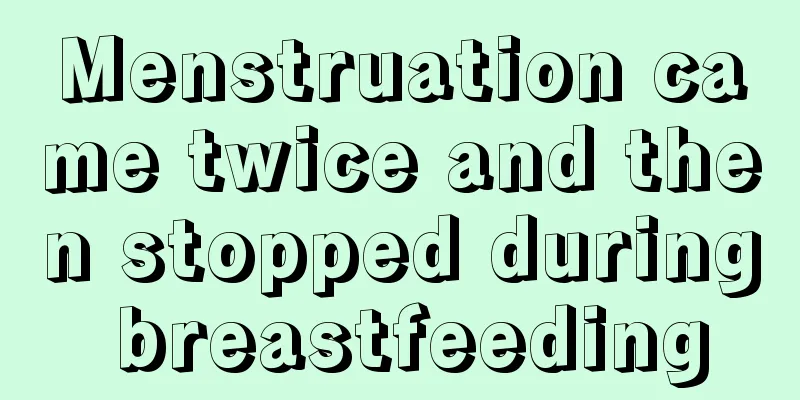Menstruation came twice and then stopped during breastfeeding

|
During the breastfeeding period, menstruation comes twice and then stops. Generally speaking, this is a normal physiological phenomenon. It is mainly because women's estrogen secretion is still unstable during this period. With good conditioning, this situation will gradually improve after a period of time. After giving birth, the relationship between the resumption of menstruation and ovulation and breastfeeding is relatively large, so don't worry too much and pay more attention to nourishment in daily life. Menstruation came twice and then stopped during breastfeeding Generally, women who are not breastfeeding will resume menstruation 6 to 8 weeks after delivery, while for women who are breastfeeding, it may resume menstruation as early as 8 weeks or as late as more than a year after delivery. This situation is normal. Will I have my period while breastfeeding? It is a normal physiological phenomenon to have menstruation during breastfeeding. After giving birth, the resumption of menstruation and the timing of ovulation will be affected by breastfeeding. Mothers who do not breastfeed usually welcome their "old friend" 6-10 weeks after giving birth. The recovery time of menstruation for breastfeeding mothers is generally delayed, and some mothers may not have menstruation at all during the breastfeeding period. There is a phenomenon worth noting: the first menstrual-like vaginal bleeding after childbirth is regarded by many mothers as menstruation. In fact, through basal body temperature measurement, 60% of them are anovulatory. Strictly speaking, it is anovulatory menstruation, which cannot be regarded as real menstruation. The amount of bleeding and duration are much longer than normal menstruation, and the menstrual cycle is also irregular. Therefore, many mothers will have abnormal menstruation for a period of time after giving birth. It is a natural physiological phenomenon for breastfeeding mothers to resume menstruation after giving birth. How long does it take for menstruation to come after giving birth? This is a common question. The time of recovery may be early or late. Some women may have menstruation as early as one month after the baby is one year old, while others may not recover until the baby is one year old. For mothers who breastfeed their babies, their ovulation and menstruation recovery are relatively slow. For mothers who do not breastfeed, the recovery time of menstruation after delivery will be faster than that of breastfeeding mothers, about 6-10 weeks faster. For most postpartum mothers, the amount of menstrual blood will be heavier than usual during their first menstrual period, but it will basically return to normal by the time the second menstrual period comes. Therefore, mothers do not need to be overly nervous and no treatment is needed. When menstruation comes, the amount of milk a breastfeeding mother produces generally decreases, and the quality of the protein and fat in the breast milk also changes slightly, with the protein content being higher and the fat content being lower. This milk sometimes causes indigestion symptoms in babies, but this is a temporary phenomenon and will return to normal after the menstrual period. Therefore, there is no need to stop breastfeeding whether you are menstruating or after your period. |
<<: Can wrist pain during breastfeeding heal on its own?
>>: Pain in the inner thigh of pregnant women
Recommend
Which minority language is easier to learn? Which input method can switch to minority languages?
With the increasing frequency of international ex...
Why is there a fear of heat in late pregnancy?
During pregnancy, expectant mothers will notice t...
Is breast augmentation or breast enlargement better?
Now, we are going to discuss a question in detail...
What causes premenstrual breast pain?
We know that, except for middle-aged women with a...
Breast tenderness and nipple protrusion
In life, many women suffer from breast diseases. ...
Why should I take Yuting with vitamin C?
Jin Yuting is a common emergency contraceptive, m...
HPV vaccine interval
The HPV bivalent vaccine has already been availab...
Leucorrhea with blood and dull pain in the lower abdomen
We know that women have an ovulation period every...
Will irregular menstruation affect fertility?
People are under a lot of pressure nowadays, so m...
Early symptoms of hepatitis B in women
Hepatitis B is harmful to the liver and cannot be...
What is the reason for the yellow leucorrhea after miscarriage?
For women, it is normal to have leucorrhea. The m...
The effect of drinking rose during menstruation
Rose is a flower that we ladies like very much. R...
7 secrets hidden in the female uterus
The uterus, a pear-shaped organ in a woman's ...
The girl stood up and felt dizzy and black in front of her eyes
Everyone may need to do something in daily life, ...
How to treat pearly rash in women
I believe many people have heard of female pearly...









